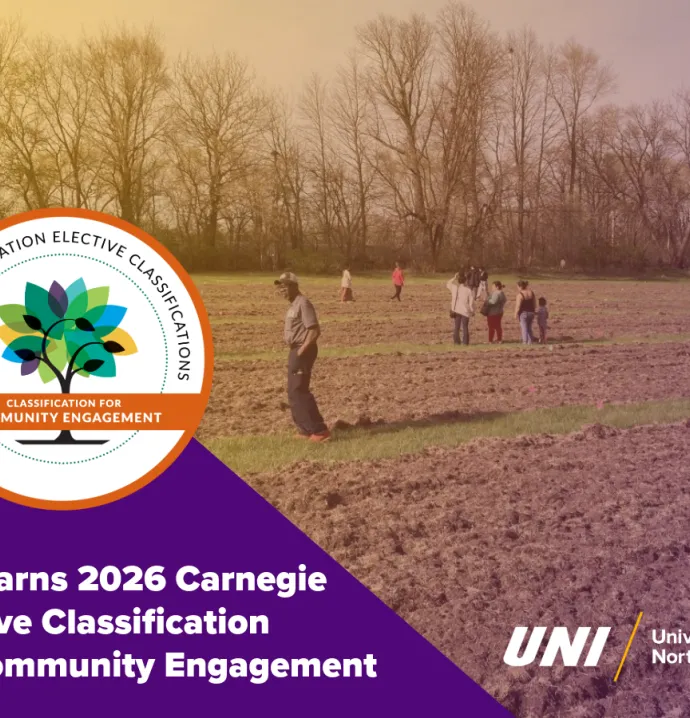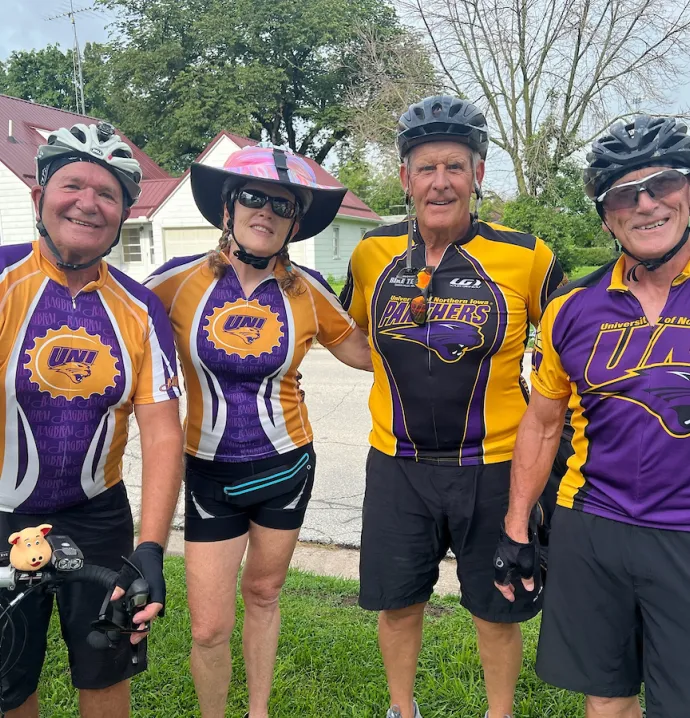An interview with Erin Brockovich
An interview with Erin Brockovich
Erin Brockovich, then a single mom and law clerk, became a household name after an Oscar-winning film starring Julia Roberts told the story of her dogged investigation into groundwater contamination in Hinkley, Calif. and the historic class-action lawsuit that followed. On Feb. 25, Brockovich gave her talk “The Power of One” in the Great Hall of the Gallagher Bluedorn Performing Arts Center.
In a recent interview with InsideUNI, she spoke about her lifelong fight for environmental causes, her struggles with dyslexia and her advice for UNI students looking to make their own mark on the world.
It's been 20 years since the movie “Erin Brockovich” came out but water quality is still an issue in many parts of the US. How does it feel to see how much work there is left to be done? What unique considerations are there for largely rural/agricultural areas like Iowa?
I celebrate my 60th birthday in June and honestly, I wake up everyday and I can’t believe I started out on this journey as a young woman at 30 and not only are we still talking about this issue, but the big issue is not even better, it’s worse. And it’s worse because we’re finding out what’s really been going on underneath our noses. (In rural areas) the farmers are the eyes of what’s going on. If they see a change in something, how important would it be for that farmer to be at city council, to be involved politically? Farmers know that and they're rooted in that, but I think most of us have moved away from ourselves. I think we’ve disconnected from ourselves because we’re disconnected from the environment.
The utility company PG&E that was behind Hinkley was criminally convicted in 2016 after a gas pipeline explosion killed eight people and is in bankruptcy after its equipment was found to have caused California wildfires that killed dozens of people. What does that say about how hard it is to change corporate culture in the US and how did all that make you feel after your own fights with the company? How hopeful are you that these issues will be resolved?
I think things are more hopeful than they’ve been when I did the Hinkley case. While it was frustrating and took 10 years of my life, and took people’s lives, PG&E did get rid of the antiquated system and went to fan-cooled systems instead of dumping everything into unlined ponds. We do have orders the state has been following through well enough on. So that was, during all of this, some progress forward for improvement. And then we got into the San Bruno explosion, which I worked on with PG&E. Understanding their pipelines, I realize we’ve got to talk about infrastructure. Our infrastructure is failing. These are water systems and gas and pipelines that are 200 years old and companies haven’t put their profits back into them. I do think the train maybe has now hit the wall. It took a disaster for us to wake up, but I do see that happening right now. 2020 is a great moment, a pivotal shift. People are popping their head up saying, ‘What the hell is going on? Where have I been?’ And it will be up to us to follow through again.
You've spoken about your struggles with dyslexia and how your mother and an amazing teacher inspired you to overcome it. What's your advice to students who have the same struggles?
It’s just a matter of believing in yourself. Just because you’re different doesn’t mean you’re inferior. And if somebody’s bullying you, it’s because they’re insecure. It comes from insecurity and fear that the other person might be experiencing themselves but they won't let that veil drop. It’s like, ‘I don’t want to let you know that I’m scared too, so I’m gonna’ bite you!’ My whole life, I’ve had to push out of the box and it comes from positive affirmations from my mom and dad. Learning the word stick-to-it-iveness’ definition the propensity to move forward in dogged determination born of obligation and stubbornness - helped. It is through that process you’ll find your voice and find your empowerment and find that you’re comfortable with yourself and that, yeah, I’m not perfect and yeah, I have that flaw. But I believe in who I am. I’m the best person I can be. Let all the negativity and self doubt out of your mind. Stop the facade. You’ll find common ground.
Despite increasing evidence that we are in the midst of environmental catastrophe, many people still have doubts about climate change. What would you say to someone who’s not sure what to believe?
I think most people can see changes in their environment, whether they see changes in their drinking water or they’re learning about how their climate is changing. Whether you believe it or not, research it, find out facts and information, have conversations with your friends, in school and class. It really is shocking for people and it’s overwhelming. To find out that things have been slipped through the cracks or concealed from us takes a moment for people to process. It takes time for people to wake up.
Your talk is called "The Power of One" but you've also spoken about how it took many people working together to address what happened in Hinkley. What's your advice to college students looking to make their own mark on the world?
I never thought that through this whole process what I would really learn was that change has to come from within you. The greatest thing I can do is pass the torch to each and every individual to find the power within them. At the end of the day, if everything’s going to s*** in a handbag, who you have to look to to save the situation and figure out what you’re going to do is yourself. You’re not going to be able to control everybody in every situation that’s happening around you, but how are you gonna’ react? How are you gonna’ respond? What is it you’re going to do to protect yourself? That can inform your neighbor? That will help protect your family? There’s a lot of things that we can be doing. Imagine if each individual did that across America. We might actually get something done.
What projects are you working on now?
My book is coming out in August, it’s called “Superman is Not Coming.” The idea behind the title is this:, what I think is happening is people are waiting for permission — but you don’t need to wait for permission to be proud of who you are, to love who you are, and stand up for who you are and what you believe in.
This interview was edited for clarity and length.




